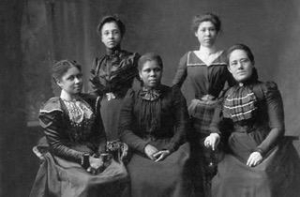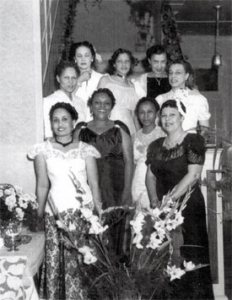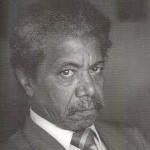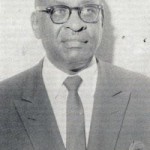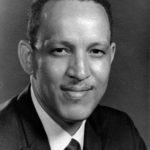African-American women breaking barriers in the military
“It’s important to find your voice”
(KRBC, Abilene) Over the last decade, women serving in leadership roles has become more common and that includes in our nation’s military.
KRBC works to continue to highlight those who make a difference every day and put their lives on the line to protect ours. It takes guts to do anything outside of your comfort zone but it is especially courageous to join the military, and taking this a step further: a woman joining the military.
KRBC’s Pheben Kassahun spoke with various women in the military who are breaking through barriers.
“There’s nothing that can break you. It’s only what you give up,” Specialist Eurika Reynolds-Williams said.
“I think, predominantly as a nation, we are so fortunate in the United States to be diverse. We are the most diverse country in the world and that’s what makes us so great,” Lieutenant Colonel Shamekia Toliver said.
“I think we bring a different perspective to the Air Force. not just our race in general, but with that it does add an extra ‘umph’ to it,” Major LaToya Smith said.
These three courageous women are just a few unicorns in the military. (more)
Texas Women’s History Month: African-American Suffrage
(KUT) While Texas women petitioned for a suffrage amendment to the state constitution in 1868, racism prevented most of them from working with African-American suffragists. When women won the right to vote in 1918, prejudice in the form of poll taxes, white primary laws and the Ku Klux Klan still deprived black women of their right to vote.
Despite opposition, black Texas women still fought to influence politics. They became delegates to the 1918 state Republican convention, worked with the NAACP to find legal remedies and formed their own voters’ league. In 1920, Mrs. R.L. Yocome, a black Houston woman, may have been the first female to run for the state Legislature.
Even though their efforts continued across the state, it took the elimination of the poll tax, the decline of the Klan and the combined power of the Civil Rights Act of 1964 and the Voting Rights Act of 1965 for black Texans to gain full access to voting.
Listen to the podcast here.
Discovering 300 Years Of The African American Experience In San Antonio
(Texas Public Radio) As San Antonio celebrates its Tricentennial anniversary, are we telling the entirety of the city’s story? Is enough attention being paid to the contributions of different ethnic groups over time?
San Antonio has a deep background in African-American history and culture. Black communities helped shape the area’s demographics and individuals like Ella Austin, Artemisia Bowden, and Charlie Bellinger continue to have a lasting influence on San Antonio.
From early settlement, Reconstruction and the civil rights movement to equity issues existing today – what themes carry through the years for African Americans in San Antonio and what can we learn from this rich history?
How do we make sure the city’s black heritage is remembered with respect and accuracy?
Guests:
•Carey Latimore, associate professor and chair of the history department at Trinity University
•Mario Salas, civil rights advocate and professor of African-American studies at the University of Texas at San Antonio
Listen to the podcast here.
Celebrating African American Achievements in Film and TV
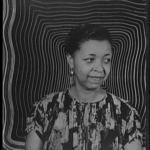 (DirectTV) Beginning back as far as the early 1900s, African Americans have continually pushed barriers in film and television as well as many other areas of society. We invite you to take a look at this timeline celebrating all of the extraordinary achievements of African American directors, writers, actors, producers and more throughout the years.
(DirectTV) Beginning back as far as the early 1900s, African Americans have continually pushed barriers in film and television as well as many other areas of society. We invite you to take a look at this timeline celebrating all of the extraordinary achievements of African American directors, writers, actors, producers and more throughout the years.
Pictured: Ethel Waters (was) the first African-American to star in her own television program — June 14, 1939: The variety show was known as “The Ethel Waters Show on NBC.” View timeline here.
TIPHC Bookshelf
 Published scholarship on black history in Texas is growing and we’d like to share with you some suggested readings, both current and past, from some of the preeminent history scholars in Texas and beyond. We invite you to take a look at our bookshelf page – including a featured selection – and check back as the list grows. A different selection will be featured each week. We welcome suggestions and reviews. This week, we offer, “Recovering Five Generations Hence, The Life and Writing of Lillian Jones Horace,” edited by Karen Kossie-Chernyshev.
Published scholarship on black history in Texas is growing and we’d like to share with you some suggested readings, both current and past, from some of the preeminent history scholars in Texas and beyond. We invite you to take a look at our bookshelf page – including a featured selection – and check back as the list grows. A different selection will be featured each week. We welcome suggestions and reviews. This week, we offer, “Recovering Five Generations Hence, The Life and Writing of Lillian Jones Horace,” edited by Karen Kossie-Chernyshev.
Born in the 1880s in Jefferson, Texas, Lillian B. Jones Horace grew up in Fort Worth and dreamed of being a college-educated teacher, a goal she achieved. But life was hard for her and other blacks living and working in the Jim Crow South. Her struggles convinced her that education, particularly that involving the printed word, was the key to black liberation.
In 1916, before Marcus Garvey gained fame for advocating black economic empowerment and a repatriation movement, Horace wrote a back-to-Africa novel, Five Generations Hence, the earliest published novel on record by a black woman from Texas and the earliest known utopian novel by any African American woman. She also wrote a biography of Lacey Kirk Williams, a renowned president of the National Baptist Convention; another novel, Angie Brown, that was never published; and a host of plays that her students at I. M. Terrell High School performed. Five Generations Hence languished after its initial publication. Along with Horace’s diary, the unpublished novel, and the Williams biography, the book was consigned to a collection owned by the Tarrant County Black Historical and Genealogical Society and housed at the Fort Worth Public Library. There, scholar and author Karen Kossie-Chernyshev rediscovered Horace’s work in the course of her efforts to track down and document a literary tradition that has been largely ignored by both the scholarly community and general readers.
In this book, the full text of Horace’s Five Generations Hence, annotated and contextualized by Kossie-Chernyshev, is once again presented for examination by scholars and interested readers.In 2009 Kossie-Chernyshev invited nine scholars to a conference at Texas Southern University to give Horace’s works a comprehensive interdisciplinary examination. Subsequent work on those papers resulted in the studies that form the second half of this book.
This Week in Texas Black History
Mar 4
In 1960, on this day, students from Texas Southern University, led by Eldrewey Stearns, held Houston’s first sit-in protest at a Weingarten grocery store lunch counter. This protest introduced a new aspect in the struggle for equal rights in Houston and helped dismantle segregation in the city. By Aug. 25, 1960, supermarkets, drugstores and hotels had desegregated. 1950.
Mar 6
On this day in 1972, basketball star Shaquille O’Neal was born in Newark, New Jersey. His father was a U.S. Army sergeant and O’Neal spent part of his childhood in Germany, but began standing out on the basketball court at Cole Junior-Senior High School in San Antonio. In 1989, O’Neal led Cole to the 3A state championship and was named national high school Player of the Year. He played professionally for 19 seasons and won world championships with the Los Angeles Lakers and Miami Heat.
Mar 6
Civil Rights activist Dr. Lonnie Smith died on this day in 1971. A native of Yoakum, Smith started a dental practice in Galveston in 1925 after graduating from Meharry Medical College in Nashville. He attempted to vote in the 1940 Democratic Primary but was denied a ballot at his Houston precinct because voting in was open only to whites. With help from the NAACP, Smith filed a suit that reached the U.S. Supreme Court which ruled in his favor. The ruling opened primary voting to all eligible Texans.
Mar 7
On this day in 1942, the first cadets graduated from flying school at Tuskegee, Alabama. In June 1943, the first squadron of black aviators, the 99th Pursuit Squadron, flew its first combat mission, strafing enemy positions on the Italian Island of Pantelleria. Overall, there were 32 Texans who graduated from the school between 1942 and 1946 and flew as Tuskegee pilots, and many others from Texas who served in support groups – mechanics, administration, etc.ans.
Mar 9
Legendary Motown producer, composer, and musical director Gil Askey was born in Austin on this day in 1925. Askey attended the original Anderson High School and played trumpet in the marching band. At Motown, Askey was musical director for Diana Ross and worked with other artists, including Stevie Wonder, the Jackson Five, Marvin Gaye, and the Four Tops. Askey was nominated for an Academy Award for his work on the 1972 film “Lady Sings The Blues” based on the life of Billie Holliday.ns.
Mar 9
On this day in 1930, innovative jazz saxophonist Ornette Coleman was born in Fort Worth. His album “Sound Grammar” received the 2007 Pulitzer Prize for music. By age 14, Coleman had taught himself to play the instrument and read music. In 2007, he also received a Grammy Award for lifetime achievement. In 2009, Coleman received the Miles Davis Award from the Festival International de Jazz de Montréal for his contributions to the evolution jazz.
Blog: Ron Goodwin, Ph.D., author, PVAMU history professor
Ron Goodwin’s bi-weekly blog appears exclusively for TIPHC. Goodwin is a San Antonio native and Air Force veteran. Generally, his column addresses contemporary issues in the black community and how they relate to black history. He and the TIPHC staff welcome your comments.
Latest Entries
Not much has changed
“These are guys with the name D-Money, Smoothie, Shifty – these types of guys – they come from Connecticut and New York, they come up here, they sell their heroin, they go back home,” (Governor
Looking Back in Wonder
Looking Back in Wonder How I got over how I got over How I got over how I got over My soul look back and wonder how I got over How I got over how
Submissions wanted
Historians, scholars, students, lend us your…writings. Help us produce the most comprehensive documentation ever undertaken for the African American experience in Texas. We encourage you to contribute items about people, places, events, issues, politics/legislation, sports, entertainment, religion, etc., as general entries or essays. Our documentation is wide-ranging and diverse, and you may research and write about the subject of your interest or, to start, please consult our list of suggested biographical entries and see submission guidelines. However, all topics must be approved by TIPHC editors before beginning your research/writing.
We welcome your questions or comments. Please contact Mr. Michael Hurd, Director of TIPHC, at mdhurd@pvamu.edu.

